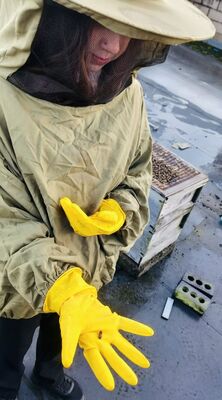BEEKEEPERS say that when you’re moving your beehive you should either move it three feet or three miles. Otherwise the bees will abandon it.
Even if it’s being moved from one side of the garden to the other, it should be done just three feet at a time. Bees are oriented to know exactly where their home is and if it has been moved too far, they will just go back to the old location.
But on the other hand, if they all wake up in the hive in a totally new location with none of their old patch to orientate them, they might just decide to stay put and embrace their new territory.
Even then, it’s not like you can just pick up a hive and cart it across town - it can be a dangerous activity. And not just for you, but for anyone around. It must be done with great care at night when the swarm is asleep.
Dúlra certainly knows the truth of that – he's suffered more than enough stings over the years, once by a swarm of wasps on Black Mountain that landed him in A&E pleading for help.
For Éamon Jackson to get a hive to his rural Donegal home took an incredible amount of care. But as Dúlra saw this week, the hard work has paid off.
Éamon and wife Eílis took the brave step to move to Donegal with their four children 19 years ago. The Andersonstown couple had always holidayed in the Gort a’ Choirce Gaeltacht area and when a house became permanently available, decided to fully embrace country life.
And the local Gaeltacht school certainly welcomed the new influx of children as Scoil Náisiúnta Chaiseal na gCorr feared were in danger of losing one of their two teachers because of falling pupil numbers.
And there was even better news for the school – the Belfast couple had two more children while they were in Donegal! The children are all thriving, playing for local teams and fluent in Irish. And now with the arrival of grandson, baby Fiachra, the couple have truly laid down deep roots in Donegal.
Life in Donegal always seems to Dúlra to be much more varied than that in the city. People try their hand at many things to make a living, something that undoubtedly stretched back generations.
Éamon's day job is building homes, but the couple also have a few sheep, a donkey, a vegetable patch and – finally – a fully working hive of native Irish bees supplying honey.
“A beekeeper I knew passed away and his son was allergic to them and asked if I wanted the hive,” Éamon said.
The hive was over the three-mile limit so moving it had to be carefully planned – it was sealed under darkness and carefully loaded on to a trailer to be driven to its new home in his garden.
When daylight came and the bees emerged, he could only pray they’d be too far away from their old home to find their way back. And so it was. The bees had to reset their GPS to a whole new area. When Dúlra saw the hive last week, the bees were arriving in a steady stream, despite being battered by Storm Betty.
These black Irish honey bees are among the world’s toughest, having extra hair to protect them from our soaking summers. They are getting rarer, but produce a beautifully pure, dark honey.
“I get a couple of jars of honey from it every year,” Éamon (51) said. “It’s nice to share around the family, and especially for Fiachra,” he said.
With such a superfood to nourish him, it would be no surprise if Fiachra ended up some day starring on the pitch for his county - although hopefully not against Antrim!
• If you’ve seen or photographed anything interesting, or have any nature questions, you can text Dúlra on 07801 414804.






